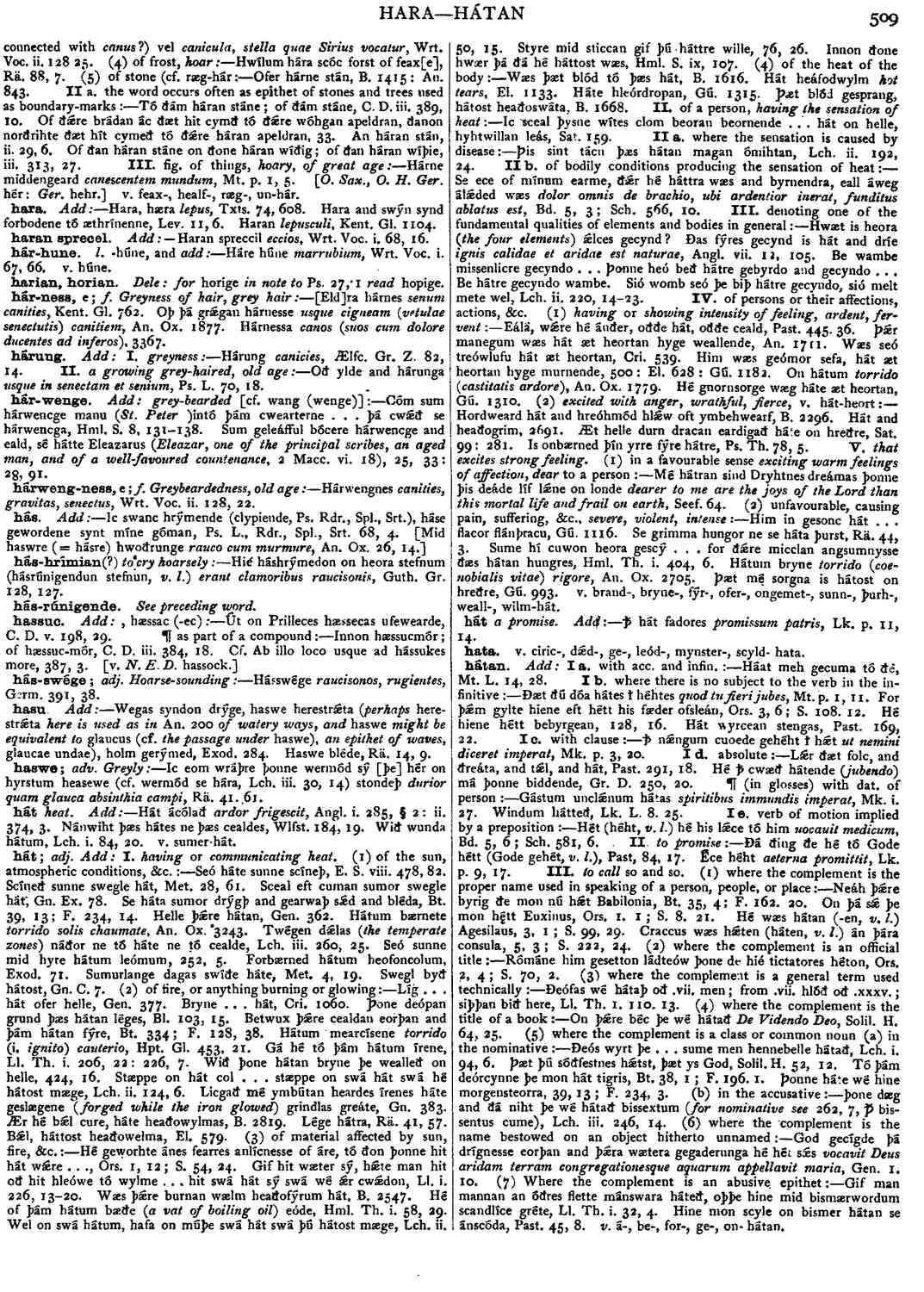hát
- adjective
-
Seó háte sunne scíneþ,
- E. S. viii. 478, 82.
-
Scíneð sunne swegle hát,
- Met. 28, 61.
-
Sceal eft cuman sumor swegle hát,
- Gn. Ex. 78.
-
Se háta sumor drýgþ and gearwaþ sǽd and bléda,
- Bt. 39, 13; F. 234, 14.
-
Helle þǽre hátan,
- Gen. 362.
-
Hátum bærnete
torrido solis chaumate,
- An. Ox. 3243.
-
Twégen dǽlas (
the temperate zones
) náðor ne tó háte ne tó cealde,- Lch. iii. 260, 25.
-
Seó sunne mid hyre hátum leómum,
- 252, 5.
-
Forbærned hátum heofoncolum,
- Exod. 71.
-
Sumurlange dagas swíðe háte,
- Met. 4, 19.
-
Swegl byð hátost,
- Gn. C. 7.
-
Líg . . . hát ofer helle,
- Gen. 377.
-
Bryne . . . hát,
- Cri. 1060.
-
Þone deópan grund þæs hátan léges,
- Bl. 103, 15.
-
Betwux þǽre cealdan eorþan and þám hátan fýre,
- Bt. 334; F. 128, 38.
-
Hátum mearcísene
torrido (i. ignito) cauterio,
- Hpt. Gl. 453, 21.
-
Gá hé tó þám hátum írene,
- Ll. Th. i. 206, 22: 226, 7.
-
Wið þone hátan bryne þe wealleð on helle,
- 424, 16.
-
Stæppe on hát col . . . stæppe on swá hát swá hé hátost mæge,
- Lch. ii. 124, 6.
-
Licgað mé ymbútan heardes írenes háte geslægene (
forged while the iron glowed
) grindlas greáte,- Gn. 383.
-
Ær hé bǽl cure, háte heaðowylmas,
- B. 2819.
-
Lége hátra,
- Rä. 41, 57.
-
Bǽl, háttost heaðowelma,
- El. 579.
-
Hé geworhte ánes fearres anlícnesse of áre, tó ðon þonne hit hát wǽre . . . ,
- Ors. 1, 12 ; S. 54, 24.
-
Gif hit wæter sý, hǽte man hit oð hit hleówe tó wylme . . . hit swá hát sý swá wé ǽr cwǽdon,
- Ll. i 226, 13-20.
-
Wæs þǽre burnan wælm heaðofýrum hát,
- B. 2547.
-
Hé of þám hátum bæðe (
a vat of boiling oil
) eóde.- Hml. Th. i. 58, 29.
-
Wel on swá hátum, hafa on múþe swá hát swá þú hátost mæge,
- Lch. ii 50, 15.
-
Styre mid sticcan gif þú háttre wille,
- 76, 26.
-
Innon ðone hwær þá ðá hé háttost wæs,
- Hml. S. ix, 107.
-
Wæs þæt blód tó þæs hát,
- B. 1616.
-
Hát heáfodwylm
hot tears,
- El. 1133.
-
Háte hleórdropan,
- Gú. 1315.
-
Þæt blód gesprang, hátost heaðoswáta,
- B. 1668.
-
Ic sceal þysne wítes clom beoran beornende . . . hát on helle, hyhtwillan leás, Sat. 159. II a. where the sensation is caused by disease :-- Þis sint tácn þæs hátan magan ómihtan, Lch. ii. 192, 24. II b. of bodily conditions producing the sensation of heat :-- Se ece of mínum earme, ðǽr hé háttra wæs and byrnendra, eall áweg álǽded wæs
dolor omnis de brachio, ubi ardentior inerat, funditus ablatus est,
- Bd. 5, 3; Sch. 566, 10.
-
Hwæt is heora (the four elements) ǽlces gecynd ? Ðas fýres gecynd is hát and dríe
ignis calidae et aridae est naturae,
- Angl. vii. 12, 105.
-
Be wambe missenlicre gecyndo . . . Þonne heó beð hátre gebyrdo and gecyndo . . . Be hátre gecyndo wambe. Sió womb seó þe biþ hátre gecyndo, sió melt mete wel,
- Lch. ii. 220, 14-23.
-
Eálá, wǽre hé ánðer, oððe hát, oððe ceald,
- Past. 445, 36.
-
Þǽr manegum wæs hát æt heortan hyge weallende,
- An. 1711.
-
Wæs seó treówlufu hát æt heortan,
- Cri. 539.
- Him wæs geómor sefa, hát æt heortan hyge murnende, 500: El. 628 : Gú. 1182.
-
On hátum
torrido (castitatis ardore ),
- An. Ox. 1779.
-
Hé gnornsorge wæg háte æt heortan,
- Gú. 1310.
-
Hordweard hát and hreóhmód hlǽw oft ymbehwearf,
- B. 2296.
- Hát and heaðogrim, 2691.
-
Æt helle durn dracan eardigað háte on hreðre,
- Sat. 99: 281.
-
Is onbærned þín yrre fýre hátre,
- Ps. Th. 78, 5.
-
Mé hátran sind Dryhtnes dreámas þonne þis deáde líf lǽne on londe
dearer to me are the joys of the Lord than this mortal life and frail on earth,
- Seef. 64.
-
Him in gesonc hát . . . flacor flánþracu,
- Gú. 1116.
-
Se grimma hungor ne se háta þurst,
- Rä. 44, 3.
-
Sume hí cuwon heora gescý . . . for ðǽre micclan angsumnysse ðæs hátan hungres,
- Hml. Th. i. 404, 6.
-
Hátum bryne
torrido (coe*-*nobialis vitae) rigore,
- An. Ox. 2705.
-
Þæt mé sorgna is hátost on hreðre,
- Gú. 993.
Bosworth, Joseph. “hát.” In An Anglo-Saxon Dictionary Online, edited by Thomas Northcote Toller, Christ Sean, and Ondřej Tichy. Prague: Faculty of Arts, Charles University, 2014. https://bosworthtoller.com/51791.
Checked: 0